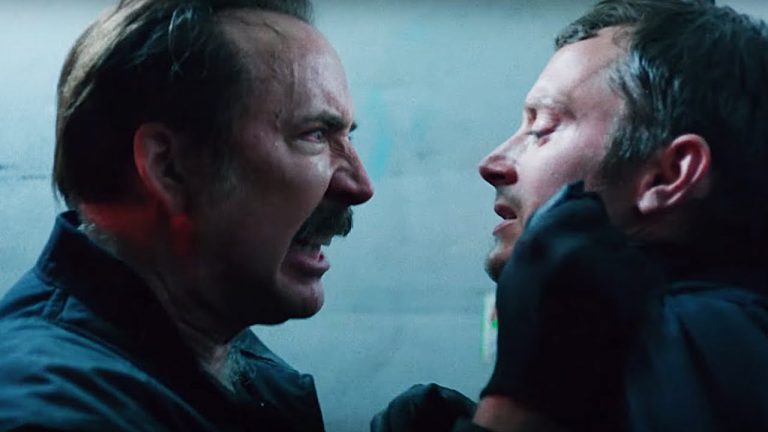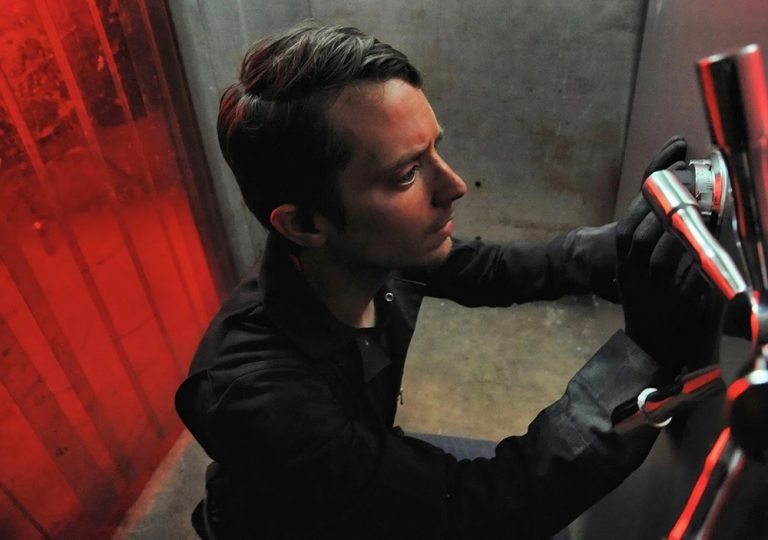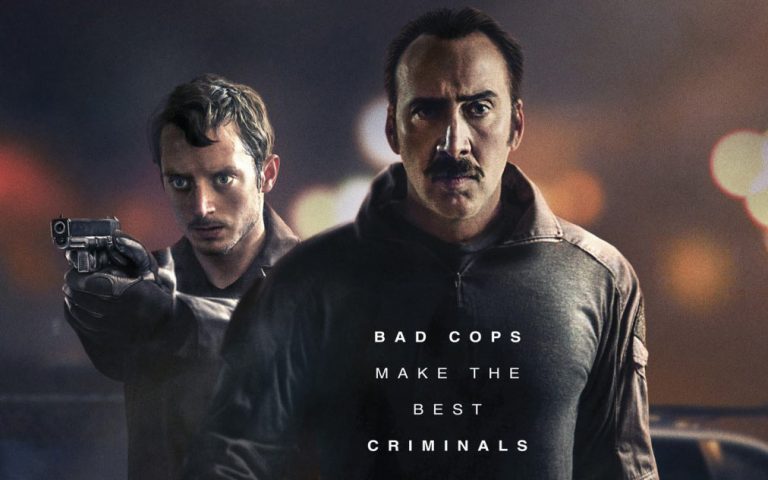Elijah Wood Talks Nic Cage, Finding a Corpse While Making 'The Trust'
by, Kristy Puchko May 10, 2016 Spinoff Online

From “Radio Flyer” to “North” to “The Lord of the Rings,” Elijah Wood has grown up in the spotlight, working with acclaimed directors and some of the world’s most admired actors. But with the crime-thriller “The Trust,” this cool customer with a storied career faced a new challenge, co-starring with the one and only Nicolas Cage, an actor so unusual, so omnipresent, so iconic that he has become a living legend.
“The Trust” stars Wood and Cage as a pair of dirty cops in Las Vegas whose lives are forever changed when they uncover the location of a drug lord’s personal vault. Employing their police skills for nefarious means, this duplicitous duo plots a heist that’s as bonkers as you’d expect from a Cage movie.
Following “The Trust’s” world premiere at SXSW, SPINOFF sat down with Wood to discuss the film’s production. Previously, we shared how this led into his thoughts on the state of film criticism. Today, we dig into what drew Wood to “The Trust,” what it was like working with the mythic Cage, and that time a body was discovered while shooting on location in Sin City.
Spinoff Online: What attracted you to “The Trust?”
Elijah Wood: Initially it was really the script. I got it through very traditional means, my agent sent it to me. He’d read it, loved it. And I read it and loved it. It was that simple in a way. It was so idiosyncratic and just kind of funny but also very dark. It didn’t feel like what would you expect from a corrupt cop film or a heist film. It had real world stakes for what it means to go about embarking on something like that. And I love the characters. At its core it’s a two-hander, a buddy movie on some level. And so after I read the script and really loved it, I met with the directors, and became familiar with their work. I saw some of their music videos, stuff like that. Mostly we just talked about the script and the way they wanted to make the film, and the way they wanted to shoot it, influences they had, musical ideas they had for the film. And they just had such a clear vision for the film that they wanted to make that I found it elevated what I’d even read. And then the opportunity to work with Nic Cage. He was attached for I think a year before I came to read it.
Do you remember what your first Nic Cage viewing experience was?
Oh that’s a good question. Um, it may have been “Raising Arizona,” but I feel like I must have seen something before that.
I think that’d make you a cooler kid than me. My first memory of him was “Peggy Sue Got Married,” which I was really into even though it didn’t make sense to me as a child at all.
It’s great. What about “Vampire’s Kiss?” I feel like I saw when I was younger too. And that’s awesome. He’s incredible in that film. I think I saw that early. But “Raising Arizona” definitely stands out as an early film. But I feel like there must have been something that was more commercial that I saw.
Maybe “Moonstruck” or something?
Maybe, yeah.
I was trying to place that myself the other day because he’s such an iconic actor. Was that at all intimidating for you? I mean, you’ve worked with huge stars. But Cage is more than a star, he’s a meme!
Even beyond that he’s such an iconic actor and such and extraordinary actor doing so many different things, and remaining so vital for so long. It was different than anything, anticipation-wise. I’ve been lucky enough to work with some incredible actors. And there’s always a sense of enthusiasm and excitement to work with someone that you admire and a kind of healthy nervousness about meeting those people for the first time. For sure. Nic was something else. You know?
Yeah, he’s almost mythic.
He is a little bit. And he almost operates on a different level that is like cultural iconography or something. He’s in the realm of pop culture in a way that no other actor really is. He is kind of mythic in a way. So, yeah, I was probably more nervous than I’d ever been and more excited. It was just an exceptional thing.
We shot the thing in Vegas. I drove from L.A. on a Friday before the Monday starting work. So we only had two days to rehearse. It was me, Nic, [co-directors] Ben and Alex [Brewer] in an open warehouse room. And we just ran through everything. It was there that I got to know him, and we were just [snaps his fingers] in from the moment go. It was an exceptional thing to see him work, to get a vibe off of him, and realize quickly how well we worked together. Moreover, I suppose how well we got on. It was really easy to spend time around him and to work with him. It’s one of my favorite experiences working with another actor. It was just an absolute joy. He was not a disappointment by any means. He was totally inspiring.

There’s a strange moment in “The Trust” where the two of you eat a lemon slice covered in Tabasco sauce. I want to know anything about that.
[Laughs] It wasn’t his idea I don’t think. It was in the script. It came from the minds of Ben and Alex and [co-writer Adam Hirsch]. I’m not really sure!
He eats the peel too!
He does.
Was that in the script, “he eats the peel”?
I think so, “he eats the whole thing.” I’d never seen that or heard of that before, so I think it was made up for the film. But it’s such a strange idiosyncratic moment that’s really kind of defining for the character. It’s part of what I loved about the script and the film too, ultimately, is how well-drawn these characters are. There’s all these little character moments, all these funny little idiosyncratic moments within the context of the piece without having to resort to exposition or explaining too much about who these people are. You get enough from these subtle little inferences about who they are that contextualizes them. And I love that. I love when a film doesn’t have to set things up for you. And you learn a lot if you pay attention. It’s all kind of there for you. A lot of it is expressed in character moments. It’s good writing and it’s strong filmmaking because it doesn’t have to resort to typical tricks or too much explanation, which I think hampers films oftentimes.
So, there’s actually a sparse amount of trivia about this film available right now. I like to explore the “trivia” tab on IMDB, and it’s random fun facts. And it was just like “they shot in Las Vegas which was problematic because of audio troubles.” But that’s not good trivia, that’s a given shooting in any metropolitan area.
[Laughs] Sure, yeah.
So I’m curious if you have any good trivia about making “The Trust” that you want people to know about.
A dead body was discovered while we were shooting.
WHAT!?
Yeah! We were shooting on location. I can’t remember what we were shooting but our basecamp was-oh! We were doing the scene with Ethan [Suplee] where we break into the cupcake shop, the bakery. So that morning, basecamp was in this sort of parking lot, where there’s all these cars and trucks parked. And a dead body was discovered in one of the trucks. And I think it had been there for like a week or two. I think it was the smell [that drew attention]. It may have been someone from our transportation department that actually discovered the body.
Oh my god.
Yeah. And the police were called. They came over, removed the body.
Did that affect production? I know that sounds like a crass question.
Because it was at basecamp, it didn’t really.
Right, because the cameras weren’t shooting near there.
No. And we were shooting like down the road, so it didn’t really except for being kind of sort of sobering, and a little fucked up and sad. People said they’d smelled it and could still smell it because obviously they’d opened the truck’s door.

And it’s Vegas so it’s hot.
And I couldn’t recognize the scent because I didn’t get too close to it. I sort of regret not going to have a look, actually, to be honest with you. Which is sort of fucked up.
You missed your “Stand By Me” moment.
It’s that classic thing where you know, you’re curious, right?
Yeah.
So I sort of regret. I think our producer Braxton [Pope] had a look. A few people did. Not to say that that is quintessentially Vegas, that’s what happens, but Vegas is kind of a seedy place.
And The Trust is a seedy story.
It totally is! But like Vegas is this great adult playground, but the world outside of it is kind of sad. I don’t want to give Vegas too bad a name because obviously everyone who worked on the film a lot of them live in Vegas. There’s a great side to Vegas as well that I never knew. I didn’t know what it meant to be a local there. But there’s a seedy underbelly as well. So that was just a very interesting reminder of like how things can go south in Vegas.
I would say so! So the past several years, you’ve been taking on a lot of really interesting projects. It seems to me – and correct me if I’m wrong – but it kind of seems like with “Lord of the Rings” you got your “Fuck You” money, and now you can just do whatever as a producer and an actor.
[Laughs] Not so much. I think I’ve always been interested in trying new things and could never settle, or rest on my laurels, or just settle on one kind of thing. I think as a person in this creative realm, I just want to be challenged and enjoy new experiences and get to work with different creative teams on varying things. I think if anything that has just solidified the older that I’ve gotten. So I don’t know if it so much has to do with having done something super massive, and then being like, “I’m going to do crazy shit.” It’s not as calculated as that.
It’s really is just based on genuinely having a gut response to something. And this is a good example of that. Having read the script, I loved the script. I was intrigued by what the directors wanted to do, and I really wanted to work with Nic Cage. As a complete package it was a really exciting notion, and it was a character unlike any character I’ve played before. He’s a different sort of dude. I’m speaking to Wood, who’s 40 but looks 30, over Zoom. He is mid-morning perky in a Los Angeles hotel room; I’m at home in London at the end of a long day of bingeing on Ted Bundy podcasts and documentaries in preparation. It’s left me in need of a stiff drink, I confess — but I’ve resisted pouring one because I know Americans can have a different view of alcohol. “I wouldn’t have judged you,” Wood says. “I feel quite European in my sensibilities anyway.”
He is engaged and thoughtful in his answers, laughing readily. His easy charm shouldn’t come as a surprise: he is already an old pro who has been in the business for more than 30 years, made more than 60 films — and whose working life can be split into BR (before Rings) and AR (after Rings).
Wood was born in Iowa, where his parents ran a delicatessen, but moved with them to Hollywood, where he still lives, at the age of eight. After starting his career in commercials and popping up in two Paula Abdul music videos in the 1980s, he progressed into movies and has seemingly worked nonstop since. In the 1990s, BR, he grew up in films such as The War (opposite Kevin Costner), The Good Son (opposite Macaulay Culkin) and Flipper (opposite dolphins, real and animatronic). After appearing in Ang Lee’s The Ice Storm in 1997, the late revered film critic Roger Ebert declared young Wood to be “the most talented actor, in his age group, in Hollywood history”.